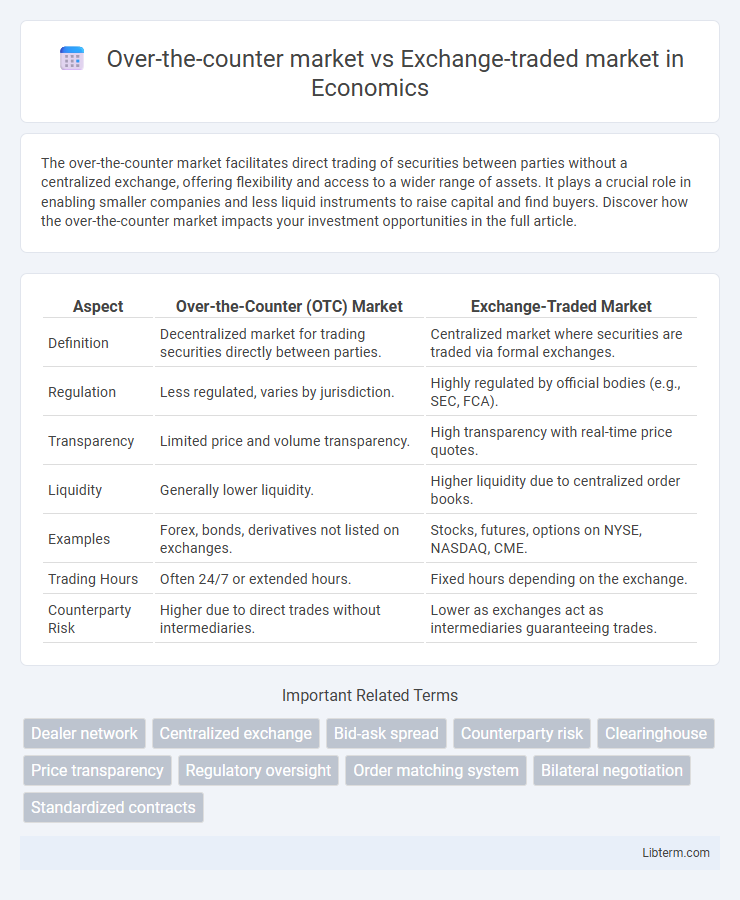The over-the-counter market facilitates direct trading of securities between parties without a centralized exchange, offering flexibility and access to a wider range of assets. It plays a crucial role in enabling smaller companies and less liquid instruments to raise capital and find buyers. Discover how the over-the-counter market impacts your investment opportunities in the full article.
Table of Comparison
| Aspect | Over-the-Counter (OTC) Market | Exchange-Traded Market |
|---|---|---|
| Definition | Decentralized market for trading securities directly between parties. | Centralized market where securities are traded via formal exchanges. |
| Regulation | Less regulated, varies by jurisdiction. | Highly regulated by official bodies (e.g., SEC, FCA). |
| Transparency | Limited price and volume transparency. | High transparency with real-time price quotes. |
| Liquidity | Generally lower liquidity. | Higher liquidity due to centralized order books. |
| Examples | Forex, bonds, derivatives not listed on exchanges. | Stocks, futures, options on NYSE, NASDAQ, CME. |
| Trading Hours | Often 24/7 or extended hours. | Fixed hours depending on the exchange. |
| Counterparty Risk | Higher due to direct trades without intermediaries. | Lower as exchanges act as intermediaries guaranteeing trades. |
Introduction to Over-the-Counter and Exchange-Traded Markets
Over-the-counter (OTC) markets facilitate the direct trading of financial instruments between parties without centralized exchange involvement, offering flexibility in negotiating prices and customized terms. Exchange-traded markets operate through regulated platforms such as the New York Stock Exchange or NASDAQ, providing standardized contracts, greater liquidity, and enhanced transparency. Understanding the structural differences between OTC and exchange-traded markets is essential for assessing risk, pricing, and regulatory protection in securities trading.
Key Features of Over-the-Counter Markets
Over-the-counter (OTC) markets feature decentralized trading directly between parties without a centralized exchange, allowing for more flexible negotiation of terms and customized contracts. OTC markets often involve stocks, bonds, derivatives, and currencies not listed on formal exchanges, with transactions typically conducted via dealer networks or electronic platforms. The market's lower regulatory requirements and less transparency contrast with exchange-traded markets, impacting liquidity and risk management.
Key Features of Exchange-Traded Markets
Exchange-traded markets offer centralized platforms where securities like stocks, bonds, and derivatives are bought and sold with high transparency and regulatory oversight, ensuring standardized contract terms and price discovery. They provide liquidity through continuous trading sessions and often feature clearinghouses that reduce counterparty risk by guaranteeing trade settlement. Market participants benefit from real-time pricing, strict disclosure requirements, and increased investor protection compared to over-the-counter markets.
Major Instruments Traded in OTC Markets
Over-the-counter (OTC) markets primarily facilitate the trading of instruments that are not listed on formal exchanges, including derivatives like options and swaps, corporate bonds, and foreign exchange products. These markets support customized contracts tailored to specific needs, such as interest rate swaps and credit default swaps, which are less standardized compared to exchange-traded futures and options. The OTC market's flexibility in instrument design allows for a broader range of risk management and investment strategies beyond the standardized products in exchange-traded markets.
Major Instruments Traded on Exchanges
Major instruments traded on exchanges include stocks, bonds, futures, options, and exchange-traded funds (ETFs), all of which benefit from standardized contracts and regulated environments enhancing liquidity and transparency. Equities dominate stock exchanges like the NYSE and NASDAQ, while futures and options are primarily traded on derivatives exchanges such as the CME Group. Exchange-traded instruments provide price discovery, regulatory oversight, and centralized clearing, distinguishing them from over-the-counter market products.
Pricing and Transparency: OTC vs Exchange
Over-the-counter (OTC) markets typically lack centralized pricing, resulting in less transparent and variable price formation driven by direct negotiations between parties. Exchange-traded markets provide transparent, standardized pricing with real-time price quotes published on a centralized platform, enhancing price discovery and market integrity. This transparency in exchange-traded markets attracts greater investor confidence compared to the opaque pricing mechanisms found in OTC markets.
Regulation and Oversight: OTC vs Exchange
The over-the-counter (OTC) market operates with less regulation and oversight compared to exchange-traded markets, often relying on bilateral agreements and less transparent price discovery. Exchange-traded markets are heavily regulated by entities such as the SEC or FCA, ensuring standardized contracts, centralized trading, and increased market transparency. This regulatory framework in exchange markets provides greater investor protection and reduces counterparty risk relative to the OTC environment.
Liquidity and Market Accessibility
The over-the-counter (OTC) market typically exhibits lower liquidity due to fragmented trading and less stringent regulatory oversight, resulting in wider bid-ask spreads and limited market depth. Exchange-traded markets offer higher liquidity with centralized order books, standardized contracts, and transparent pricing, enabling efficient price discovery and easier trade execution. Market accessibility in OTC is often restricted to institutional investors and involves bespoke agreements, whereas exchange-traded markets provide broader access to retail and institutional investors through regulated platforms with standardized product offerings.
Risks and Benefits of Each Market Type
Over-the-counter (OTC) markets offer greater flexibility and access to a wider range of securities, but carry higher counterparty risk and less transparency compared to exchange-traded markets. Exchange-traded markets provide standardized contracts, increased liquidity, and regulatory oversight that reduce fraud and default risks. Investors must weigh the benefits of customizable OTC trades against the safety and reliability of exchange-traded securities.
Choosing the Right Market for Investors and Traders
Investors and traders must evaluate liquidity, transparency, and regulatory oversight when choosing between over-the-counter (OTC) markets and exchange-traded markets. Exchange-traded markets offer higher liquidity, standardized contracts, and stringent regulatory protection, which suits investors seeking security and price transparency. OTC markets provide flexibility with customized contracts and access to less liquid securities, appealing to sophisticated traders willing to accept higher counterparty risk for tailored investment opportunities.
Over-the-counter market Infographic

 libterm.com
libterm.com